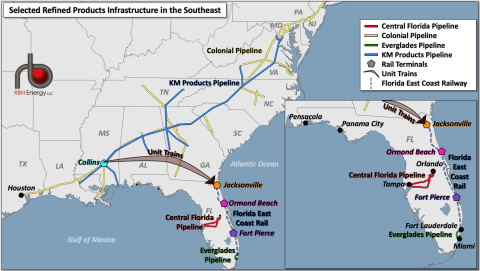Florida is entirely dependent on others for the vast amounts of refined products it consumes — every gallon of gasoline, diesel and jet fuel that’s pumped into cars, SUVs, trucks, locomotives and airplanes in the Sunshine State needs to be either shipped or trucked in. Now, a midstream company is planning a project that would enable large volumes of refined products to be railed into Florida by unit trains to three new storage and distribution terminals — and eventually several more. In today’s RBN blog, we discuss the plan.
Florida is the third-largest state in the U.S. by population after California and Texas, with more than 22 million residents, the vast majority of whom depend on gasoline or diesel to get around. On average, Floridians drive a collective 650 million miles a day, or enough to get Elon Musk to the moon and back more than 1,300 times. And speaking of hurtling through space, Florida is #2 — behind only California — in its consumption of jet fuel, a fact that will come as no surprise to anyone who has flown into or out of Orlando or Miami.
Despite its enormous appetite for refined fuels, Florida doesn’t produce a drop of the stuff — instead, every bit of it needs to be either shipped in by tanker or trucked in by, well, trucks. As we said a few years ago in Move It on Over, the vast majority of the refined products consumed in the state are produced in Texas and Louisiana and shipped by Jones Act-compliant tankers and barges to one of several Florida ports, where gasoline, diesel and jet fuel are offloaded into storage tanks, then either transferred to tanker trucks or, in a few cases, piped to inland distribution points.
The deepwater ports at Tampa and Port Everglades (near Fort Lauderdale) are by far the largest recipients of tankered- or barged-in fuel (each averaging over 200 Mb/d); other Florida ports receiving significant volumes are Jacksonville and Port Canaveral (both on the state’s upper Atlantic coast) and (with much lesser volumes) Pensacola on the state’s Panhandle. To help move fuel to market, Florida has four pipelines. Kinder Morgan’s Central Florida Pipeline System (red line in Figure 1) has two lines from Tampa to Orlando: a 16-inch-diameter pipe that moves batches of gasoline and denatured ethanol, and a 10-inch-diameter pipe that moves mostly jet fuel to Orlando International Airport. The state’s two other pipelines also focus on jet fuel; there’s Buckeye Partners’ 55-Mb/d Everglades Pipeline (green line) from Port Everglades to the Fort Lauderdale-Hollywood and Miami international airports and the short, 18-Mb/d Tampa Airport Pipeline (not shown).
Figure 1. Selected Refined-Products Distribution Assets in the Southeast. Source: RBN
Join Backstage Pass to Read Full Article









